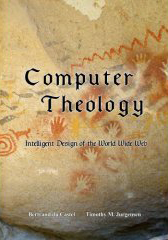PRESS
 |
COMPUTER THEOLOGY |
||||
1 Tat Tvam
Asi
Nada-Bindu
Upanishad In The
Beginning
Humans are
social animals. As members of the species, we are embedded within social
systems from the time of our birth to the time of our death. It has always been
so. We cannot survive our infancy without the support of a social order. Our
natural condition as adults is to engage in social interaction. If we’re ever
incarcerated, solitary confinement is the penultimate sanction for abrogation
of the rules of the social order, exceeded only by execution. Should we seek to
do so, our abilities to lead solitary lives devoid of social contact are
characteristics more tolerated than endorsed by the social systems in which we
exist. Personal isolation is not our normal posture. In the XVIIth
Century, John Donne expressed this social state of being in his Meditation XVII
(published in the Works of John Donne
by Henri Alford): No man
is an island, entire of itself; every man is a piece of the continent, a part
of the main; if a clod be washed away by the sea, Europe is the less, as well
as if a promontory were, as well as if a manor of thy friend’s or of thine own
were: any man’s death diminishes me, because I am involved in mankind, and
therefore never send to know for whom the bells tolls; it tolls for thee. A social existence is not the result of a lifestyle selection on our parts. We are driven to seek social acceptance and social structure by our physiological makeup. Our perception of the world around us is defined by our sensory system and the stimuli for our response to that world are driven by needs that have common form across all members of the species. Hence, Donne’s reflection addresses not a personal choice, but rather a physiological condition of the biophysical person. At least since the emergence of proto-historical records and artifacts of modern humans more than 30,000 years ago, social structures have extended beyond those based purely on |
||||
|
||||
© Midori Press, LLC, 2008. All rights reserved for all countries. (Inquiries) The contents of ComputerTheology: Intelligent Design of the World Wide Web are presented for the sole purpose of on-line reading to allow the reader to determine whether to purchase the book. Reproduction and other derivative works are expressly forbidden without the written consent of Midori Press. Legal deposit with the US Library of Congress 1-33735636, 2007.
|
ComputerTheology Intelligent Design of the World Wide Web Bertrand du Castel and Timothy M. Jurgensen Midori Press, Austin Texas 1st Edition 2008 (468 pp) ISBN 0-9801821-1-5 |
Book available at Midori Press (regular) |